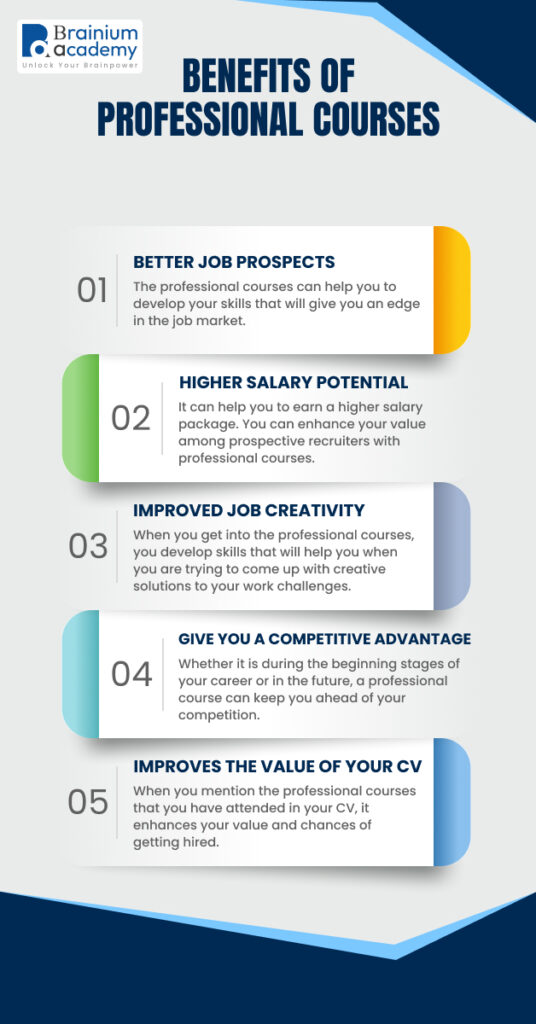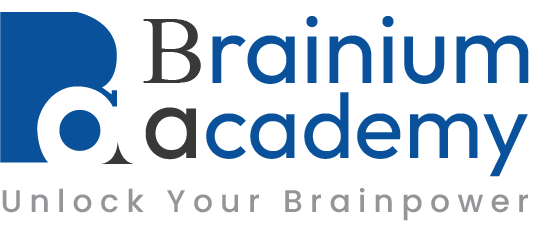
Unlocking Career Advancement: The Role of Professional Courses
In today’s rapidly evolving job market, being a graduate student or an IT enthusiast is not enough to secure a successful and fulfilling career. The dynamic nature of technology and business demands a commitment to lifelong learning and skill development. To stay ahead of the curve and open doors to exciting opportunities, it’s essential to pursue advanced certified professional courses. These courses not only expand your knowledge but also provide you with a competitive edge that sets you apart from the crowd.
Here, we will explore the significance of job-oriented courses after graduation for graduate students, IT enthusiasts, and job seekers who are looking to supercharge their careers.
The Changing Landscape of Education and Employment
The 21st century has witnessed dramatic changes in the education and employment landscape. The traditional model of obtaining a degree and relying on it for a lifetime career is fading. The job market now favors adaptable candidates, continually upgrading their skills, and staying relevant in their respective fields. Thus, professional certification helps you land a rewarding career.
For graduate students, this new reality can be daunting. The job market is more competitive than ever, and having a bachelor’s degree is often just the first step in a long journey. IT students, too, find themselves in an industry that is characterized by rapid technological advancements and shifting trends. The skills that are in demand today may become obsolete in a few years.
Job seekers, regardless of their educational backgrounds, need to understand that having a degree isn’t enough to secure a job, let alone a thriving career. Employers are looking for candidates who can demonstrate specialized skills, practical knowledge, and a commitment to professional development.

The Role of Advanced Certified Professional Courses
This is where professional courses after graduation come into play. These courses are designed to fill the gap between traditional education and the specific skills demanded by the job market. They offer several advantages to graduate students, IT enthusiasts, and job seekers:
1. Specialized Knowledge
Advanced certified professional courses provide in-depth, specialized knowledge that is directly applicable to your field of interest. Unlike a broad-based bachelor’s degree, these courses target specific skill sets, making you a sought-after expert in that particular area.
2. Hands-On Experience
Many of these courses incorporate practical, hands-on training that equips you with the skills you need to excel in real-world scenarios. This experiential learning is invaluable, as it bridges the gap between theory and practice.
3. Industry Recognition
Completing an advanced certified professional course often results in industry-recognized certifications. These certifications are a testament to your expertise and can be a significant advantage when seeking employment or career advancement.
4. Networking Opportunities
Joining an advanced certified professional course allows you to connect with like-minded professionals and experts in your field. These connections can lead to valuable networking opportunities and collaboration.
5. Career Advancement
For job seekers, advanced courses can be the key to unlocking higher-paying positions and career advancement. These courses can significantly boost your earning potential and open doors to better job prospects.
How to choose the right course?
The availability of advanced certified professional courses is vast and covers a wide range of fields. So, how do you choose the right one for you? Here are some factors to consider:
1. Your Career Goals
Begin by identifying your career goals and the specific skills or knowledge you need to achieve them. Are you looking to become a data scientist, a cybersecurity expert, a project manager, or something else? Knowing your destination is the first step.
2. Industry Demand
Research the job market and industry trends. What skills are currently in demand, which courses are included in off-campus drive, and which ones are projected to be in demand in the future? You’ll want to choose a course that aligns with these trends.
3. Course Content
Examine the course content and syllabus carefully. Does it cover the topics and skills you need to acquire? Look for courses that offer comprehensive coverage of relevant subject matter.
4. Accreditation
Ensure that the course is accredited by a reputable organization or institution. Accreditation adds credibility to your certification and is recognized by employers.
5. Reviews and Testimonials
Seek out reviews and testimonials from previous students who have taken the course. Their feedback can provide valuable insights into the course quality and its impact on their careers.
What is the return of enrolling in advanced professional courses?
One of the key considerations when deciding to take an advanced certified professional course is the return on investment (ROI). While these courses often require an upfront investment in terms of time and money, the long-term benefits far outweigh the costs. Here are some factors to consider when assessing the ROI of such courses:
1. Salary increase
Advanced certified professional courses often result in salary increases. Many employers recognize the added value that these certifications bring, leading to higher compensation packages for certified professionals.
2. Career advancement
As mentioned earlier, these courses can open doors to career advancement. Whether you are looking to move into a leadership role or shift to a different career path, the skills and knowledge gained through advanced courses can be the key to achieving your career goals.
3. Job security
In a rapidly changing job market, having specialized skills and certifications can provide a level of job security. You can also get off-campus placement. Your expertise becomes an asset to your employer, making you less susceptible to downsizing or outsourcing.
4. Personal satisfaction
Many individuals find that the personal satisfaction and fulfillment they derive from pursuing their passions and excelling in their field are invaluable. Taking advanced courses to achieve your career aspirations can lead to a higher level of personal and professional contentment.
5. Industry recognition
Industry-recognized certifications can make your resume stand out from the competition. They serve as proof of your expertise and dedication to professional development, earning you recognition and respect within your industry.
Overcoming Common Challenges
While advanced certified professional courses offer numerous advantages, there are also some common challenges that individuals may face when considering or pursuing them. Let’s address these challenges and provide guidance on overcoming them:
1. Time constraints
Many individuals, especially those who are already working, may struggle to find the time to pursue advanced courses. To overcome this challenge, consider online or part-time courses that offer flexibility. You can also set aside dedicated study time and create a structured schedule to ensure you make steady progress.
2. Financial investment
Some advanced courses can be expensive, and not everyone has the financial resources readily available. Look for scholarships, grants, or financial aid options. You can also explore employer-sponsored programs or consider taking one course at a time to spread the financial burden.
3. Self-motivation
Self-motivation is crucial when taking an advanced course. You will need to stay committed and focused on your goals. To maintain motivation, break your coursework into smaller, manageable goals and celebrate your achievements along the way.
4. Balancing work and study
If you are working while pursuing an advanced course, it can be challenging to balance your professional responsibilities and your studies. Effective time management and communication with your employer or supervisor are key. Many employers are supportive of employees seeking professional development and may offer flexible hours or study leave.
5. Fear of failure
It’s natural to have concerns about failing or not performing well in a course. Remember that learning is a journey, and setbacks are part of the process. Seek support from peers, instructors, or mentors to overcome challenges and build resilience.
The Future of Work
The future of work is rapidly evolving, and advanced certified professional courses are increasingly becoming a fundamental component of career development. The following trends highlight the significance of these courses:
1. Lifelong learning
The concept of lifelong learning is becoming the norm rather than the exception. Individuals are expected to continually update their skills and knowledge to remain relevant in the workforce.
2. Hybrid work environments
Hybrid work environments, which combine remote and in-person work, are becoming more prevalent. Employees with advanced skills and certifications are better equipped to thrive in this environment.
3. Automation and Artificial Intelligence
Automation and artificial intelligence are reshaping industries. The ability to adapt to these technological changes is critical, and advanced courses can provide the necessary expertise.
4. Diversified skill sets
Employers are increasingly looking for candidates with diversified skill sets. Advanced courses allow you to acquire skills that are in demand across multiple industries, making you a more versatile professional.
5. Remote learning
The growth of remote learning platforms has made it easier than ever to access advanced certified professional courses. This flexibility has democratized education and made it accessible to a global audience.
Final Words
For graduate students, IT enthusiasts, and job seekers, the path to a successful and fulfilling career is paved with continuous learning and skill development. Advanced certified professional courses offer the perfect opportunity to acquire specialized knowledge, practical skills, and industry-recognized certifications. These courses provide a clear return on investment, not only in terms of increased earning potential but also in job security, career advancement, and personal satisfaction. So, embark on an advanced learning journey today!



